Naturalists
Naturalists
More than just nature guides, our naturalists are engaging storytellers, each with their own rich experiences and fascinating tales from the field. They are as different as their specialties—which range from geology to zoology—and their knowledge about the natural world runs wide and deep. And while they are schooled in science, they have a knack for describing species and natural phenomena in relatable ways, whether explaining the behavior of a brown bear to an elementary school student or describing the physics of glacier formation to a Ph.D. holder. They know their destination inside and out and, often, they call it home.
Our naturalists are also inspiring travel companions who participate fully in the expedition, leading excursions and also joining guests at meals or in the lounge over drinks. Each team is made of naturalists with a range of specialties, so you can set out with a botanist on a morning hike and then take an afternoon Zodiac ride with a marine biologist. Or if a naturalist shares a particular passion of yours—say birding or geology—you can choose to join the excursions they lead. Our guests have been known to book another trip just to travel with a particular naturalist again.
More than just nature guides, our naturalists are engaging storytellers, each with their own rich experiences and fascinating tales from the field. They are as different as their specialties—which range from geology to zoology—and their knowledge about the natural world runs wide and deep. And while they are schooled in science, they have a knack for describing species and natural phenomena in relatable ways, whether explaining the behavior of a brown bear to an elementary school student or describing the physics of glacier formation to a Ph.D. holder. They know their destination inside and out and, often, they call it home....
Read more
Meet our Naturalists

Dennis Cornejo
Dennis has spent more than half of his life working with Lindblad Expeditions. He first studied biology in the Sonoran Desert. It was his work with the Arizona-Sonora Desert Museum that brought him into contact with Sven Lindblad. Dennis was working with sea turtles in Mexico, desert tadpoles in southern Arizona and evaluating various legume trees for arid lands agriculture throughout the Sonoran Desert. Sven asked him if he would be interested in working on a ship as a naturalist in Baja California… a simple ‘yes’ turned out to be perhaps the most important decision he ever made! At first, life as a Lindblad naturalist, working during the winter while on break from university, exploring Baja California while guiding and lecturing, was a positive feedback loop for his academic goals. Spending time with guests, who possessed incredible amounts of life experience and enthusiasm, soon eroded Dennis’ dreams of a career in Academia. However, during this time he earned a master’s degree with a thesis on the reproductive strategies of Sonoran Desert toads and a PhD with a dissertation on the mechanical design and biogeography of columnar cacti (large cacti including the saguaro and the cardon). For almost 40 years Dennis has explored and learned with Lindblad. At first in the Sonoran Desert, then the temperate rainforest of Southeast Alaska, the topical rainforests of South America and Oceania and many, many other places: dry to wet, hot to cold. As his world experience increased, so did Dennis’ interests… from reptiles and amphibians, to flowering plants, insects and other invertebrate and lichens. He also worked for 15 years as an Undersea Specialist diving and making videos from Antarctica to Svalbard to Papua New Guinea. Now he is out of the water and on the tundra, so what next? With Lindblad Expeditions there is no limit with the whole world to choose from!
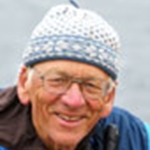
Bud Lehnhausen
Bud received an undergraduate degree in wildlife biology at Colorado State University. He then immediately went to Alaska where he worked and lived for 30 years. At the University of Alaska, Fairbanks, Bud studied wildlife biology and received a master's degree conducting research on four species of alcid seabird nesting on a remote island in the Gulf of Alaska. For a number of years he worked as a research biologist studying various fields, including moose/habitat relationships, songbird populations in relation to succession, tundra bird populations and migration, and woodpecker populations after natural forest fires. Since 1983, Bud has worked as a naturalist and expedition leader with Lindblad Expeditions-National Geographic. During these years he has traveled in the Arctic and Antarctic, temperate and tropical regions of Central and South America, Atlantic Ocean crossings, and the western South Pacific. These numerous voyages over the years have given him a chance to appreciate diversity of life and cultures which he finds fascinating. In addition to traveling, Bud is an avid natural history photographer and his wife writes children’s books on natural history illustrating them and using Bud’s photographs. Having built their own super-insulated house in Fairbanks over a 20 year period, in 2003 they relocated their family to northern Colorado. They are in the process of being owner/builders of a new energy efficient passive solar home in the foothills above Fort Collins.
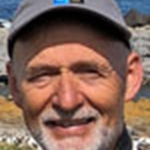
Carl Erik Kilander
Carl was born in Norway and received a master’s degree in forestry and nature conservation from the Norwegian University of Life Sciences in 1973. His professional experience is mainly connected to environmental issues and natural resource management on the Norway mainland and in Svalbard. A major part of his professional experience comprises planning and management of protected areas, particularly in the southern parts of Norway and Svalbard. During the period 1999-2001 Carl was Head of the Environmental Department at the Governor of Svalbard´s office. He has also been District Manager (southwestern Norway) followed by the position of Senior Environmental Adviser at the Norwegian State Forest Service. During the late part of his career, Carl worked as a Senior Adviser at Norwegian Nature Inspectorate (SNO), mainly dealing with law enforcement, monitoring, and public relation tasks connected to more than 100 protected areas in Vest-Agder County (southernmost Norway). During this period he has also been leading various projects. During one such project, 2011-2014, Carl was involved in the planning and successful eradication of 6,700 “Norwegian” reindeer on South Georgia. This British-Norwegian project was managed by the Government of South Georgia and the South Sandwich Islands (GSGSSI), and Carl had a key role in the preparation phase. During the field operations 2013-2014 he assisted GSGSSI’s Project Manager as liaison and leader of the Norwegian team of reindeer herders and marksmen. Carl characterizes himself as a naturalist with broad interests. He particularly favors bird watching and nature photography. Carl has had annual assignments for Lindblad Expeditions-National Geographic since 2003, joining expeditions to Norway’s fjords, Svalbard, Iceland, Greenland, South Georgia, the Falklands, and Antarctica.

Gaby Bohorquez
Gaby was born and raised in Guayaquil, Ecuador. Her first job in the Galapagos was on board a 90-passenger cruise ship as the cruise director’s assistant, and she fell under the spell of the Enchanted Isles. She returned to Guayaquil to study at the Espiritu Santo Technological University to obtain a degree in Tourism Management. Her fascination for the islands was still strong so, after finishing her studies, Gaby took the opportunity to join the Naturalist Guide’s course, jointly organized by the Galapagos National Park Service and the Charles Darwin Research Station. That was back in 1992, and she has been a naturalist since, keeping her deep love and passion for the islands during all these years. In recent years Gaby was closely involved in the logistics and organization of a two-year conservation program, which brought international teams of volunteers to help in the eradication of aggressive introduced plants –a serious threat to local ecosystems- in the highlands of Santa Cruz Island. The program was coordinated with the Charles Darwin Research Station under the seal of approval of the Galapagos National Park Service. Gaby is a certified National Geographic Field Educator, and she combines her work as a naturalist with motherhood, teaching her children Emily and Danny to know and care about their very unique birthplace. Gaby and her family moved to the United Kingdom a few years ago, and with the kids now reaching university education, she commutes back to her beloved islands several times a year. Being based in the UK makes it easy for Gaby to practice the languages she is fluent in: English, Spanish, French and German. In her time off, Gaby is a self-taught artist, and she is always seeking to learn new arts and crafts techniques, her favorites currently being paper crafts and watercolor media.

Vanessa Gallo
Vanessa Gallo’s grandparents arrived in the Galápagos Islands in 1936, making her the third generation of her family to live and work in this magical archipelago. She left the islands for the capital city of Quito for high school, where she discovered that learning foreign languages was one of her main interests. Coming from a family of naturalist guides, it was not a surprise that she also became one at the age of 17. Vanessa left the islands once again for Switzerland, where she earned a diploma in tourism and strengthened her language skills and knowledge of the travel industry. She has also travelled extensively to destinations including as Mexico, Costa Rica, Panama, Peru, Canada, the Canary Islands, Mauritius, and many European countries. She has come to realize, however, that she is never happier than when outdoors, surrounded by the unique and pristine environment of the Galápagos Islands. Although she has now been guiding for over 14 years, she never ceases to be amazed by the ecological innocence of the Galápagos wildlife and the daily surprises presented by Mother Nature on each visit. Vanessa lives in Puerto Ayora, on Santa Cruz Island, and is the proud mother of an 11 year-old boy named Luke. Together they share hobbies such as swimming, snorkeling, kayaking, hiking, reading, and astronomy. Vanessa feels incredibly fortunate to be able share this piece of heaven on Earth with others, and she is very happy that her job is also her favorite hobby!
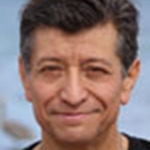
Octavio Maravilla
Octavio was born in Mexico City and moved to La Paz at age 19, to study Marine Biology at the Baja California Sur State University. He began his field research on California sea lions, working at Los Islotes, a small rookery close to La Paz City. Later, he expanded his research to all the sea lion colonies in the Gulf of California and over the Pacific coast of the Baja California Peninsula — aside sea lions, he studied three other species of Mexican pinnipeds, harbor seals, elephant seals, and Guadalupe fur seals. His graduate work includes censuses of California sea lions in five different colonies on the southern tip of the Baja Peninsula. In 1986 Octavio travelled to Paris, France, where he spent a year obtaining a degree in animal behavior. Returning to La Paz in 1987, he began research with gray whales in Mexico; a directed and coordinated international effort to do censuses with the endangered vaquita porpoise of the Gulf of California. He joined Lindblad Expeditions for a first period in 1994 until the year 2000 in Baja California. Then he engaged in further research to obtain his Ph.D., working in the Bay of La Paz, analyzing and studying the interactions between sea lions and fisheries. He obtained his degree in August 2005. Octavio rejoined Lindblad Expeditions in 2006 season working only in Baja California. He lives in La Paz, Baja California Sur, recently he retired and works teaching French at the French Alliance of La Paz.
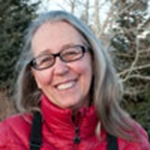
Marylou Blakeslee
For the past 20 years, Marylou Blakeslee has traveled the world sharing her love of wild places. She lectures on a number of topics from the bears and wolves of the Arctic, to the leopard seals and whales of the Antarctic, as well as the turtles and fishes of the Great Barrier Reef. Most summers Marylou works as a park ranger at Glacier Bay National Park. Fall finds her guiding trips among the “ice experts,” the polar bears of Churchill, Manitoba. Her naturalist work in Antarctica, in the austral summer, provides ample opportunity to share observations on interactions of ice, climate and marine life. Late winter, Baja beckons with grey whales birthing in warm lagoons and desert wildflowers in bloom. She also leads trips to Yellowstone for a glimpse of the winter world of the wolf. Marylou Blakeslee began her involvement with the natural world through her love of drawing and painting. Her work is included in collections across the country and internationally. Leading hikes, lecturing, kayaking, snorkeling, wildlife spotting and painting are some of her favorite things to do. Come share with her the varied natural treasures and beauty this world has to offer.

Doug Gualtieri
Doug Gualtieri has worked as a Naturalist interpretive guide for over 20 years, beginning his career in Denali National Park and Preserve at a remote wilderness lodge leading hikes and giving lectures on the ecology and wildlife of that region. Later he began leading Lindblad Expeditions land extensions to Denali in 2002 and has worked with Lindblad in some form or another ever since. With a background in Biology and a lifelong passion for the natural world Doug moved to Talkeetna, Alaska in 1999 from his home state of Michigan, and never looked back. Having studied many facets of the natural world, from general ecology to animal behavior, Doug found a strong connection to the life of birds; primarily because birds tie together so many components of our world, making them perfect teaching tools. But, also because almost all of them fly, and that’s pretty cool. Doug and his wife make their home today in the quaint, and at times, bustling Alaskan community of Talkeetna. Living in their cabin home in the boreal forest complete with a pristine salmon stream, Doug and his wife spend their time with their dogs on hikes, skis, or bikes enjoying the beauty of Alaska and the thriving community they live in.

Santiago Imberti
An ornithologist, photographer, fisherman, climber, and writer, Santiago Imberti was born and raised in southern Patagonia, Argentina. He obtained a degree in tourism and later in ornithology, which allowed him to combine his love for nature and the outdoors with his work as a birdwatcher, naturalist, fly fishing, and mountain guide. He has been guiding trips in Patagonia, the Antarctic, and Arctic for some 25 years. However, his main passion is conservation and research therefore off the ships Santiago does field work on birds, mostly in southern Patagonia and is the President of Asociación Ambiente Sur; an NGO that seeks to protect the environment and educate the new generations on a sustainable way of life in southern Patagonia. From 2009 to 2014 he has coordinated the project to save the now critically endangered Hooded Grebe, which is an endemic bird in Patagonia; and the creation of Patagonia National Park, a massive protected area that aims to save the grebe and some of the least know habitats in South America. His many articles and stories have been published in scientific journals, popular travel magazines, books, and since his singing abilities are rather poor, he has produced a couple CDs of the beautiful bird sounds of South America, Patagonia, and Antarctica. He lives in Punta Arenas, southern Patagonia, Chile, with his wife and son.
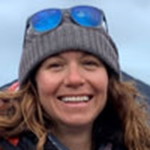
Jessica Farrer
Jessica is the San Juan County Marine Mammal Stranding Network Coordinator and Data Specialist for the Whale Museum in Friday Harbor, WA. In this role she responds to dead, stranded and entangled marine mammals including large whale disentanglement. She manages necropsies, relocation of pinnipeds and transfers of injured or sick animals to rehabilitation facilities. She is also responsible for analyzing stranding data, and researching trends in marine mammal behavior, reproduction, morbidity and mortality in the Salish Sea. She has been involved with marine mammal research for more than 15 years, most recently working for SR3 on projects that monitor the health of the critically endangered southern resident killer whales and populations of killer whales, humpback whales and minke whales on the Antarctic Peninsula. She has also worked on commercial fishing vessels in the Bering Sea and with projects studying marine mammals in Alaska, Hawaii, Washington state, the Galapagos and Antarctica. Jessica spent four seasons living in a small sea-ice camp near McMurdo station Antarctica, working with Weddell seals as part of the United States Antarctic Program. Jessica has a passion for underwater photography and freediving. She has helped research projects meet their outreach goals by collecting and contributing video and photographic media and has had the privilege of working with the BBC's Natural History Unit filming Frozen Planet in both Antarctica and Alaska. In 2019, Jessica was a winner in the highly competitive Underwater Photographer of the Year competition for an image she took during an expedition on Lindblad Expedition’s National Geographic Explorer on the Antarctic Peninsula.

Salvador Cazar
Salvador Cazar studied biology at the Universidad Nacional Del Sur, Bahía Blanca, in Argentina and at the Catholic University of Ecuador. Between 1988 and 1994, Salvador worked as a naturalist and tour leader for several national and international tour operators, leading groups of visitors across the Ecuadorian rain forest, Andean forest, and to Galapagos. From 1995 to 2011, he performed a number of functions at the public and private level for national and international organizations. Among others, he acted as the regional coordinator of the Feasibility Study for the Environmental Management Program for the Gal á pagos Islands financed by the Inter-American Development Bank; coordinator of the Ecuadorian Permanent Commission for the Gal á pagos Islands; consultant for the Project "Support to the Global Management Plan for Tourism Development and Ecological Conservation of Gal á pagos National Park and Galapagos Marine Reserve" funded by the UNDP; executive director of the Ecuadorian Association of Ecotourism; instructor of environmental interpretation for the Gal á pagos National Park and KAPAWI Ecolodge & Reserve; coordinator of the Sustainable Tourism Program of Fundación ESQUEL–Ecuador; Conservation International–Ecuador sustainable tourism specialist; and Conservation International–Ecuador socio economic coordinator. At the moment, Salvador is working as a naturalist taking groups of visitors across Gal á pagos and continental Ecuador and providing technical assistance on different aspects of responsible travel to NGO´s, government organizations and businesses.

John Pailthorpe
John spent the early years of his life in London, before an inspirational teacher took him to the highlands of Scotland on a school adventure trip. From then on the natural world has been his passion. After teacher training in Bangor, North Wales, John began a thirty-year career in outdoor education centres and schools, teaching and leading children and adults in such pursuits as mountaineering, rock climbing, kayaking, and sailing throughout the U.K. and Europe. During this time John took time out to be part of six polar scientific expeditions, as a field assistant/guide. Two of these were with the British Antarctic Survey; the first a two-month field expedition to the Eklund Islands on the Antarctic Peninsula; the second, eight months as part of a king penguin and elephant seal study on South Georgia. He served as a boat skipper/field guide on a geological expedition to the northwest of Svalbard. More recently, he took part in three expeditions to the Greenland ice cap for the Scott Polar Research Institute of Cambridge, as part of the European Space Agency's “Cryosat” project. John is well aware that his career, and the wonderful experiences it has included, all began with one special teacher. With this in mind, he likes nothing more than to pass on his enthusiasm for nature and all things outdoors, with the intention of promoting an awareness and caring attitude towards the natural environment.
Showing 12 of 124

